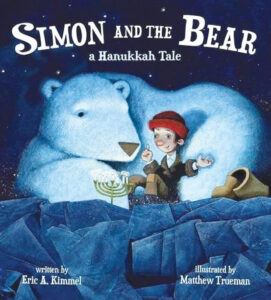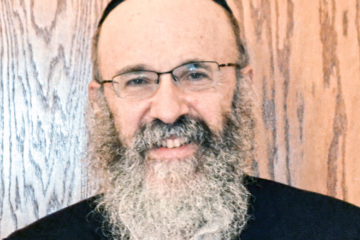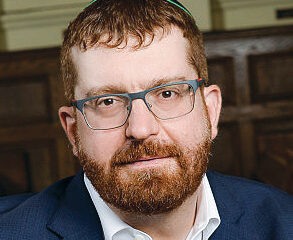We’ve always had hope

By Rabbi Tina Sobo, Temple Israel
One of my children just received Simon and the Bear: A Hanukkah Tale as their PJ Library book for the month. The tale starts out introducing Simon, a boy who is on his way to immigrate to America, when the boat he is on hits an iceberg and begins to sink. He finds himself stranded on the iceberg, alone, with just his knapsack as the sun sets for the first night of Chanukah.
Shockingly, with the help of a bear and some miracles, he survives each night, lighting his menorah, and is rescued on the last night of Chanukah – and everyone lives happily ever after.
Reading this book for the first time among my children, there was a simultaneous fear as to Simon’s fate, and reassurance that, like a fairy tale, of course it would all work out. As an adult reading it, with Chanukah approaching, and all that is going on in Israel, the message was equally clear that we can all learn a few lessons from Simon.
The PJ Library reading guide suggests that themes of gemilut chasadim (acts of lovingkindness) are reflected in various characters’ actions throughout the story, and without negating the importance of being kind and having empathy, even on our worst days, it was Simon’s hopefulness that perhaps a miracle would happen for him too.
 One of the hardest parts since Oct. 7, watching Israel’s war with Hamas continue, is a feeling of helplessness, that nothing I do here will be enough, that there is so much loss and hate in the world, among other things. The story reminds us that Jews have always had hope, even in our darkest, scariest moments. That Jews have always looked out for those around them at those moments too.
One of the hardest parts since Oct. 7, watching Israel’s war with Hamas continue, is a feeling of helplessness, that nothing I do here will be enough, that there is so much loss and hate in the world, among other things. The story reminds us that Jews have always had hope, even in our darkest, scariest moments. That Jews have always looked out for those around them at those moments too.
And so, we enter into the Chanukah season in our own day. And I recall the rabbinic question of why Chanukah is eight days long. It is based on the tradition that when the Maccabees went to rededicate the Temple, they, as legend goes, found but one small cruse of pure oil that remained fit for use and that miraculously, the oil that was sufficient for only one day lasted the eight days (the time needed to get or make additional oil).
One could argue, if there was enough oil for one day, the miracle really was only for seven days — the days that there was not sufficient oil to light the menorah. Thus, shouldn’t our holiday be only seven days long?
Rabbis over the years have come up with dozens of explanations, such as the military victory being the reason for the first night, or the ability to rededicate the Temple, or the miracle of finding the oil in the first place, and other scenarios such as that the Maccabees used only one-eighth of the oil each night, but it lasted the whole night, and so on.
I don’t need to determine which answer is the correct one. When Jews go looking, they find hundreds of miracles in the Chanukah story.
When we go looking, how many miracles can we find in our own experience? In our own time?
There have been times since the Oct. 7 attacks that perhaps we felt, individually or as the Jewish People, like little Simon on that iceberg with just a polar bear as company in a dark, scary, cold world.
I hope that just as young Simon found his blessings and miracles, and just as he created them for the others in the book too, that we are able to live by his example.
We watched 290,000 Jews gather in the largest rally for Israel ever. Maybe a miracle will occur and by the time you read this, our homeland will be once again at peace, with hostages returned to their families.
As we gather this month around our own Chanukah menorahs and remember the miracles of the Maccabees, may we remember to be a light unto the nations as well, bringing miracles and light to each other and the world, in as much as we hope for them in our own lives.
To read the complete December 2023 Dayton Jewish Observer, click here.





